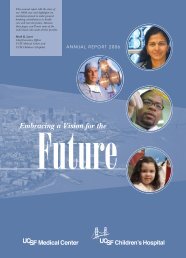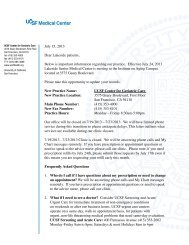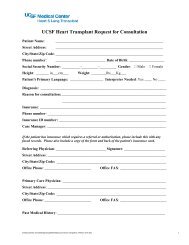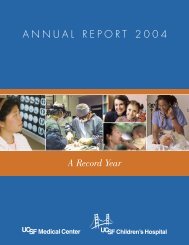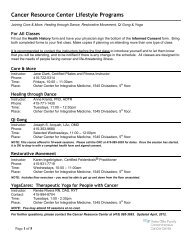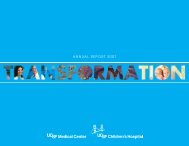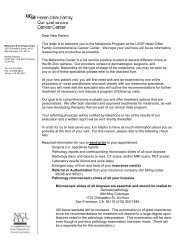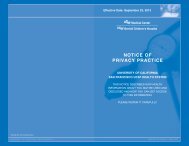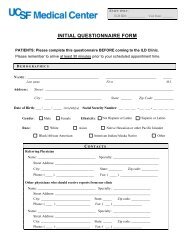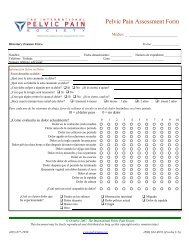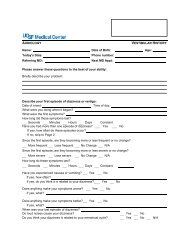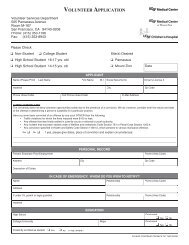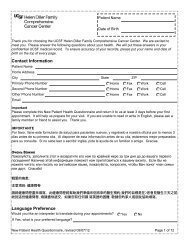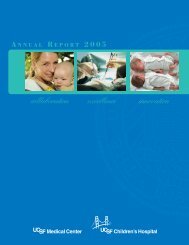c e n t e r n e w s l e t t e r - UCSF Medical Center
c e n t e r n e w s l e t t e r - UCSF Medical Center
c e n t e r n e w s l e t t e r - UCSF Medical Center
You also want an ePaper? Increase the reach of your titles
YUMPU automatically turns print PDFs into web optimized ePapers that Google loves.
We Can Help You Break Your Smoking Habit<br />
The Tobacco Education <strong>Center</strong> (TEC) at <strong>UCSF</strong> <strong>Medical</strong> <strong>Center</strong> at Mount<br />
Zion Hospital and <strong>Medical</strong> <strong>Center</strong> offers comprehensive smoking cessation and<br />
relapse prevention support. Cessation program sessions are held on an ongoing<br />
basis at <strong>UCSF</strong> Mount Zion Hospital. Suzanne Harris, RN, TTS, a former<br />
smoker with more than 20 years experience in helping smokers quit, facilitates<br />
group and individual sessions. The TEC cessation program has earned a reputation<br />
for excellence. On graduation from the program, more than 50 percent of<br />
participants have stopped smoking, and 47 percent are still smoke-free after one<br />
year. What better way to help yourself, a friend, or a loved one?<br />
Cessation program classes meet in a weekly 1-3/4 hour session for four<br />
weeks. Participants set a “quit date” between the third and fourth weeks.<br />
Topics covered include:<br />
• Effects of smoking on your lungs, heart and other organs.<br />
• Effects of carbon monoxide (CO), a by-product of smoking. Participants have an opportunity<br />
to have their CO level measured by a simple breathing test.<br />
• Motivation: what it is, how to recognize it and how to build on it.<br />
• Nicotine replacement therapies (gum, patch, inhaler, spray and lozenge) and the smoking<br />
cessation medications Zyban and Chantix.<br />
• Emotional factors that maintain the smoking habit and nicotine’s effect on the brain.<br />
• Ways to impact internal thought processes and change behavior.<br />
• Health benefits of cessation.<br />
• Trouble-shooting specific problems that are encountered.<br />
• Setting goals and preventing relapse.<br />
All graduates of the cessation program are eligible to attend a weekly relapse prevention support<br />
group, whether or not they have stopped smoking.<br />
The Tobacco Education <strong>Center</strong> also offers individual appointments with physicians specializing in<br />
tobacco dependence treatment.<br />
Registration Fee: $55 (includes a personal copy of all written materials and loan of videotapes used<br />
in the sessions.) To register, or for more information, please call 415/885-7895.<br />
Note from Laura:<br />
We all are looking for what we can do to prevent breast cancer. In the meantime, we do know what<br />
we can do to reduce the chance of getting lung cancer, emphysema, and heart disease and that is<br />
not to smoke. If you, or someone you care about, smokes, make the effort to help them stop. Use<br />
the resources in the community. Together we really can make a difference.<br />
Editor: Laura Esserman Editorial Consultant: Leslie Lingaas<br />
Design : Jennifer Melnick, Olio Arts<br />
This newsletter is distributed free of charge to our current patients and to providers and caregivers.<br />
We are very grateful for any support we receive to help offset our printing and distribution cost.<br />
If you wish to make a donation, please use the envelope provided in this issue. Thank you!<br />
BREAST CARE CENTER NEWSLETTER • SPRING 2008 • page 11



